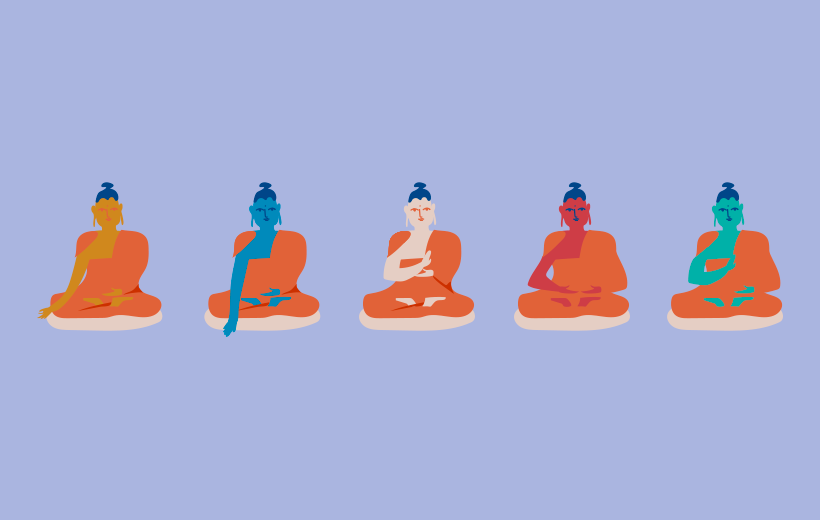Five Buddha Families: Emotions As Gateways
By Antonia Sumbundu • 3 min read

IN MANY PSYCHOLOGICAL APPROACHES to spiritual practice, difficult emotions are seen as obstacles to be eliminated. We have been conditioned to believe that anger is bad, that jealousy is toxic, that confusion means that there is something wrong. So we try to push these emotions away, to suppress them, or just to move beyond them entirely.
But what if there is something essential that we are missing when we are taking this approach? In the Vajrayana tradition, a very different perspective is offered. Here, emotions like confusion, anger, desire, pride, and jealousy are not problems in themselves. They are forms of energy that, when met with awareness, can reveal a profound wisdom.
So it is not about becoming emotionless or being calm all the time, but about discovering the intelligence or the wisdom within every emotional experience. The anger that we are trying to control actually contains the energy of clarity. The desire we struggle with holds the wisdom of discernment. And the jealousy that we may feel ashamed of carries the power of accomplishment. The pride that we are trying to overcome contains the seed of genuine confidence. And even confusion, the most disoriented state, holds the spaciousness of open awareness.
This is not just a helpful reframing — it also points to something much deeper, which is the dynamic nature of the mind itself. Emotions are not fixed. They are displays of awareness. They are energy in motion, and when we relate to them skillfully, they can be understood and liberated.
Traditionally, these emotions are called the “five poisons.” They arise from fundamental confusion and mistaking our thoughts and reactions for solid truths. But within each poison, there is a seed of a particular wisdom. And this transformation from poison to medicine is something that we can all experience.
Vajrayana’s “five buddha families” offer a map for this journey. Each family is linked to a particular wisdom, a psychological tendency, an element, a direction, a color, and they provide a way of understanding our inner lives and the world around us that is nuanced, that is not pathologizing, and that is deeply compassionate.
Mingyur Rinpoche shows how ignorance, which narrows the mind, can open into spacious awareness, how anger reveals mirror-like clarity, how desire is a door to discerning wisdom, how pride becomes equanimity and confidence, and how jealousy transforms into inspired accomplishment.
“Ignorance fuels misunderstanding. Aversion breeds division and violence. Craving creates endless dissatisfaction. Pride separates us. Jealousy turns connection into competition. So imagine if these energies were transformed. If communities were guided by openness instead of ignorance, by clarity instead of reactivity, by discernment instead of craving, by equanimity instead of arrogance, and by inspiration instead of comparison.”
— Antonia Sumbundu
As usual, what makes these teachings especially powerful is how Rinpoche is sharing it and how he is linking it to his personal experience. He describes his early struggles with panic and how he came to understand that trying to eliminate these feelings was not a path to freedom. At some point, he felt that he and his panic were one and the same and that it could never change, and I think we often relate to our emotions in the same way, making them sort of permanent and defining. But through practice, Rinpoche also discovered the nature of these emotions, and that allowed them to shift, not through force or avoidance, but through insight. When we move from experiencing “I am angry” to “I am experiencing anger,” we begin to separate our identity from our emotional states.
So the teachings on the five buddha families is not about emotion regulation, but about seeing clearly and then allowing this clarity to ripple out far beyond our personal practice, because these five poisons are not just internal struggles — we also see them in the struggle around us. Ignorance fuels misunderstanding. Aversion breeds division and violence. Craving creates endless dissatisfaction. Pride separates us. Jealousy turns connection into competition. So imagine if these energies were transformed. If communities were guided by openness instead of ignorance, by clarity instead of reactivity, by discernment instead of craving, by equanimity instead of arrogance, and by inspiration instead of comparison. These five buddha families offer a vision of human experience that is whole, that is dynamic, and that is filled with potential.
As we are receiving these teachings, we can also consider how these patterns appear in our own life — not as flaws, but as energies that long to be understood and to be freed. So we can notice how we relate to our emotions — if we resist them, if we get swept away by them, if we judge ourselves for feeling them — just remembering that each emotion that has caused us so much pain also carries the seed of its own wisdom, that this medicine is already here, and that Rinpoche is guiding us to see how we can discover that for ourselves.
November 2025

Antonia Sumbundu is an instructor for the Tergar Meditation Community, a clinical psychologist, and a mental health specialist. She has been practicing meditation for over 35 years and has had the good fortune to practice and study with many great teachers, including Chokyi Nyima Rinpoche, Chokling Rinpoche, and Tsoknyi Rinpoche. In 2002, she met Mingyur Rinpoche and began to receive teachings from him. She leads retreats, teaches, and supports practice groups internationally, and she is the Program and Clinical Director of a series of Accredited Psychotherapy Training Programs.
Learn meditation under the skillful guidance of world-renowned teacher Yongey Mingyur Rinpoche at your own pace.


Deadlines, competition, pressure — the concept of “burnout” to describe a sense of nervous exhaustion has been around since the 70’s, but never has the feeling of burnout been as prevalent as it is these days. In a situation that’s demanding too much of us, it’s natural to experience burnout. Still, there are certainly a…

Faced with the challenges of Crohn’s disease, philosopher Maria Müller Hornbach turned to meditation, which transformed her relationship with pain and brought greater ease to her life. Inspired by Mingyur Rinpoche’s teachings, she took Tergar’s Meditation Teacher Program, and now teaches meditation classes in Germany.

“Whether you’re sitting on a meditation cushion or standing on a stage, the key ingredients are surprisingly similar: stay present, keep it real, and don’t forget to laugh.” – Beth Schumann Korczynski
If you enjoyed reading our articles, please join our mailing list and we’ll send you our news and latest pieces.